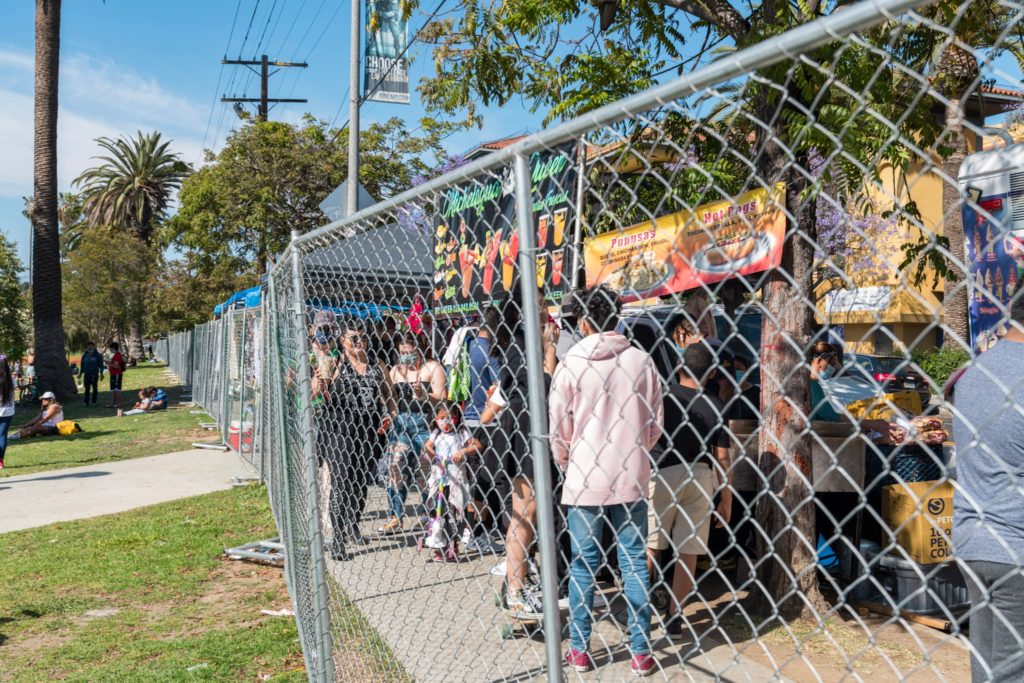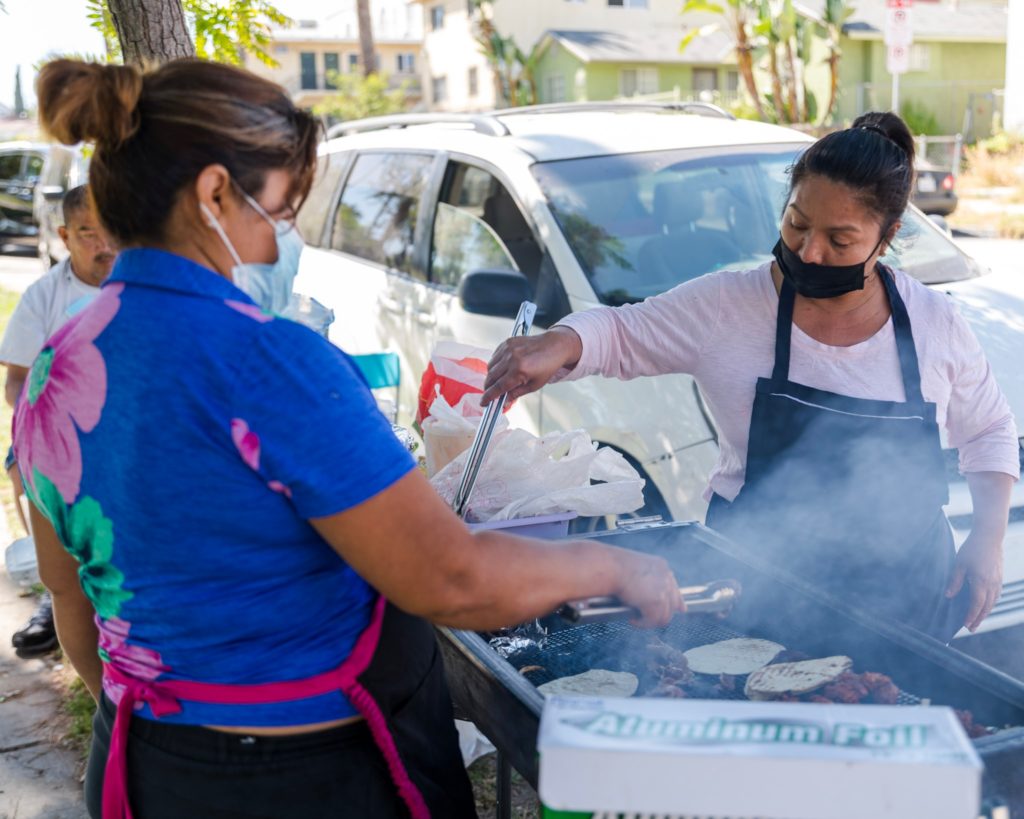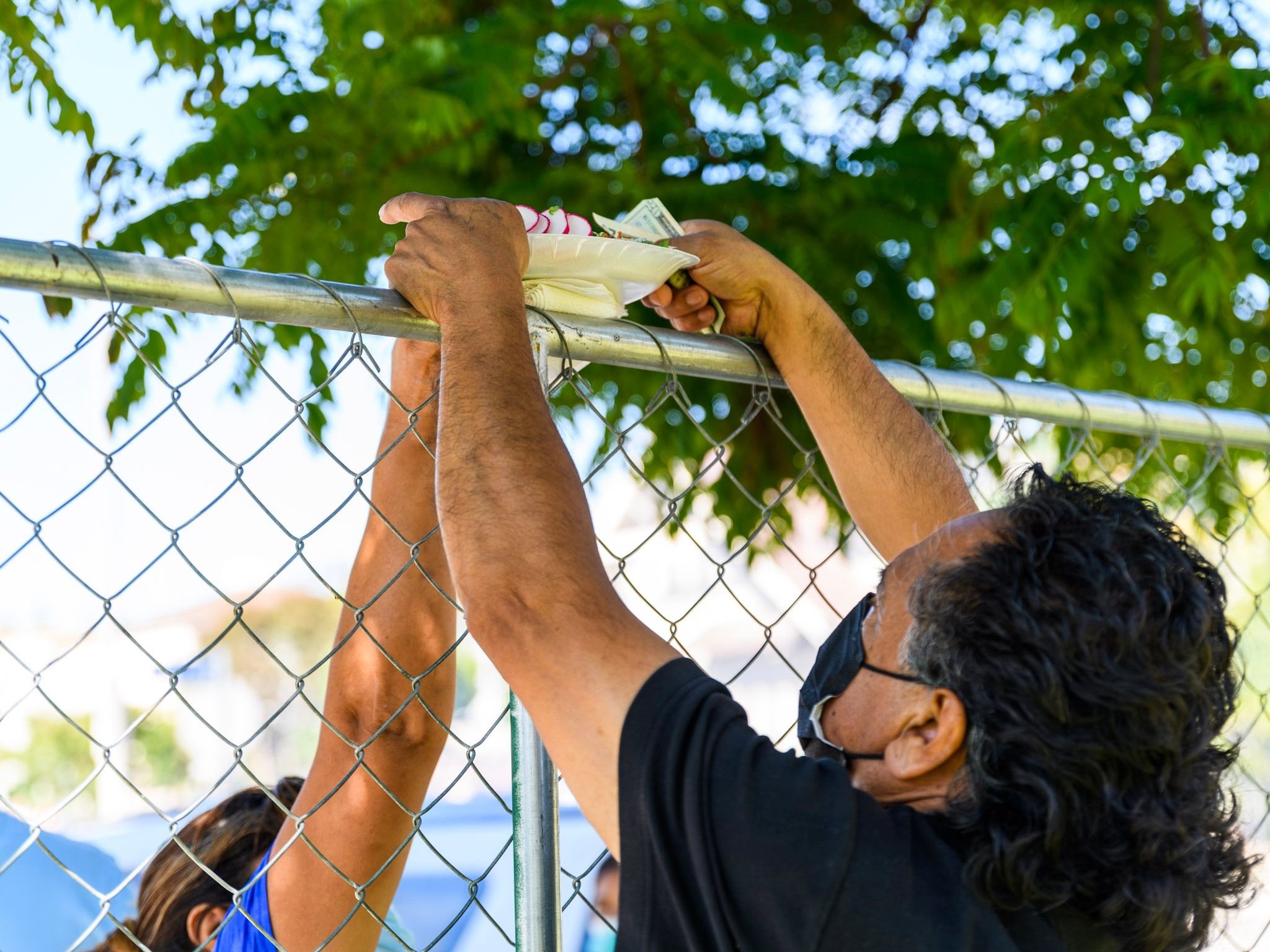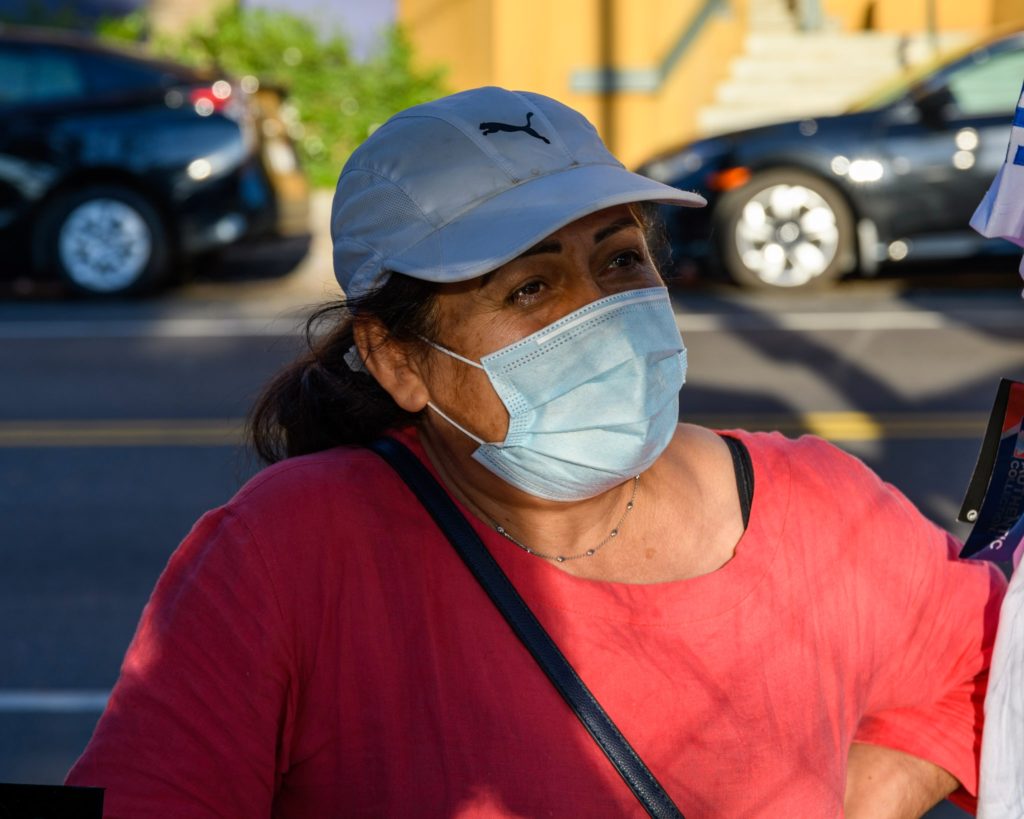The May 26 reopening of Echo Park Lake came as welcome news to sisters Maria and Veronica Hernandez, who, like many other park vendors, had been out of work for the park’s two-month closure. During that time, the sisters, who live together in Koreatown, had fallen even further behind on rent, electricity and gas bills.
But the sisters, expecting to return to their lakeside location, arrived instead to a chain link fence surrounding the park. Even more alarming to them, was that inside the fence, LAPD and city park rangers now patrolled the area, confronting vendors about whether they had a permit.
A spokesperson from the city’s Department of Public Works told me there have been no citations issued in the area since the park reopened. But the heavy presence of officers and park rangers gives vendors plenty of reasons to worry. While the city technically required vendors to have a permit prior to the park’s closure, enforcement had been lax at Echo Park Lake, vendors say. Now, those without a permit will have to decide whether they can afford to pay hundreds, and in some cases, thousands of dollars, to legally return to a location at which they had been stationed for years.

For non-food vendors — those selling jewelry, soccer jerseys, balloons or other goods — the process is relatively simple, consisting primarily of a $291 permit (the price increases to $541 beginning July 1st). For food vendors, however, the licensing is costlier — and more complex. In addition to the $291 basic permit, food vendors are required by the city to obtain a public health permit, which can range in cost from $393 to $772.
Plus, the city requires those selling cooked foods — like tacos and bacon-wrapped hot dogs, as opposed to ice cream, for example — to purchase a grill compliant with city law. One problem: the grills required by the city can be prohibitively expensive (cost estimates range between $10,000 and $30,000). These expenses come between myriad other smaller fees and bureaucratic hurdles, and after more than a year of pandemic-related restrictions and closures that have negatively impacted street vendors that rely on foot traffic. Many vendors, especially those unable to receive unemployment benefits due to their legal status, have been left in financial ruin.
When councilmember Mitch O’Farrell ordered the sudden closure of Echo Park Lake under the cover of night a little over two months ago, it was widely criticized by community advocates as an excuse to remove the unhoused residents who had set up an encampment around the lake. The surprise eviction spurred two days of protests that drew hundreds of people to the streets surrounding the park. LAPD shot multiple protesters with projectiles and made 182 arrests, according to the L.A. Times. Several journalists were unlawfully arrested and later released.
The enforcement of vendor permits are one of a number of changes that have been unveiled at the park since its reopening. Park rangers now patrol the lake on horseback and motor vehicle, and instead of staying open all night, the park now closes at 10:30pm, aided by its new chain-link fencing. Councilember Mitch O’ Farrell’s office did not immediately respond to a request for comment about whether the chain link fence will be removed or is intended to be permanent.
For now, the Hernandez sisters are among a handful of former park vendors left scattered outside the park’s fence, along the sidewalk or on street corners nearby. These areas also require a permit, and vendors there are subject to the same fees as within the park itself, but there’s one key difference: The areas outside the park don’t appear to be policed as aggressively. Or at least that’s what the sisters thought.
On the Sunday afternoon when I interviewed them, they were approached by two officers in a white van. The officers were from the Bureau of Street Services’ law enforcement division (yes, this is a real thing) and they informed Maria and Veronica Hernandez that their taco stand was in violation of a city code that prohibits vending in areas the city deems “restricted” — a separate issue from permitting. Veronica’s husband took responsibility, saying the taco stand was his. The officer gave him a warning, but the family fears that next time they might not be so lucky. The sisters packed up their taco stand and left.
The following are stories from a few longtime Echo Park Lake vendors, edited for clarity.
Maria Hernandez

I’ve been selling in the park for 23 years. When they closed the park we were left with nothing. I’ve been out of my house for a year now since the pandemic started. I go from here to there, some days with my daughter, from one place to the next. I live with my sister now but she owes a lot of money. She owes more than $2000 between rent and the electricity bill. We probably owe gas money too.
It all started with the pandemic because we couldn’t go outside for 3 months. We don’t get any help. I’m not able to get any unemployment benefits. After we realized that the pandemic wasn’t going away we started working again, risking that we would get sick. There are some that have died. A lady who used to vend over there, she died from COVID. And that scared us. But even still we weren’t selling much because people weren’t going out. And then as we started to sell more, they closed the park down.
The village where we are from, this is how we cook. It’s the tastiest. It has flavor. If I get a permit I can’t cook this way anymore.
Maria Hernandez
Closing the park hurt me, but it also hurt my son. He doesn’t understand days or time and that there is a pandemic. He’s special. He’s the dancer over there with the cowboy hat. Before the fence, if something happened, I was right there. Now if something happens, I have to go find him inside the park.
Truthfully, I don’t want to get a permit. I don’t have the energy. First you need to know how to drive, because you need to move the cart back and forth. And the way I cook, they say the smoke is not good for the environment. The village where we are from, this is how we cook. It’s the tastiest. It has flavor. If I get a permit I can’t cook this way anymore.
We’ve lived here for a long time, lots of good things have happened. We’ve survived all of these years. But there are lots of other things that have happened as well. People who have known me for years know those stories.
This interview was conducted in Spanish, and translated into English.

Por 23 años he estado vendiendo en el parque. Cuando cerraron el parque, nos quedamos con nada. Hace un año que no tengo casa. Desde que empezó la pandemia, ando de un lado al otro, unos días con mi chamaca, y ando para allá y para acá. Vivo con mi hermana, pero debemos mucho dinero en el pago de la luz y de la renta, y más de dos mil dólares y probablemente debemos para el gas también.
Todo comenzó con la pandemia, porque estuvimos encerrados por tres meses. No pudimos pedir ayuda, porque no hay un seguro social para nosotros. Ya cuando pasaron unos poquitos meses y miramos que no se quitaba la pandemia, tuvimos que salir a trabajar, aunque nos enfermáramos. Y por la pandemia también, unos murieron. La vecina, una que vendía allí, murió del Covid.
El cerrar el parque me perjudico, y también a mi niño. El no sabe los días o el tiempo y él no entiende que hay una pandemia. El es especial. Él es el bailador allí, el que lleva sombrero. Antes, si algo le pasaba, yo estaba allí mismo. Ahora si algo pasa, tengo que dar la vuelta para encontrarle dentro del parque.
Yo ahorita no quiero sacar permiso. Yo no siento la misma fuerza. En primer lugar, tienes que saber cómo manejar, porque tienes que mover el carte. Y la manera como cocino, dicen que es malo para el medio ambiente. Pero para nosotros, que somos de por allá, del pueblo, es la más sabrosa, porque tiene sabor. Si pido permiso, ya no me dejan cocinar más así.
Vivimos aquí por muchos años y hemos pasado muchas cosas buenas. Sobrevivimos todos estos años. Pero también otras cosas han pasado. Pues la gente que me conoce desde muchos años, ellos saben mi historia.
Luiza Padilla Mavropoulos

I moved to Echo Park in October of ‘78, so how many years is that? A lot. I was twenty years old when I moved in. I’m 65 now. Back then we were paying $119 per month — I think those apartments go for $1300 now.
You pick up a lot of history living here so long. I remember times, when cops would come in through the park and say, ‘ok you don’t have a permit’ and just kick your bucket over if you had food, and everything would go on the ground. Or they would confiscate, throw everything in the trunk of their car. That was in the late ’80s going into the ’90s.
I remember when families were evicted in 2009. They were camping here in Echo Park. LAPD would come at 6 a.m. every morning and tear down their tents. If they didn’t open the tents, they would cut the tents. What happened a few months ago isn’t something new — we’ve seen it going back until the 70s.
I used to have a youth group here. We were 500 strong. Gentrification totally changed that demographic. We lost everybody. You see this church right here. That church was standing room only with three parishes: English, Spanish and Korean. Anywhere you go, you’ll find a seat now. I only know one family left. Everybody else is gone.
The big issue goes back to the ’80s with the Echo Park Improvement Association (EPIA). I was the only Latina who attended those meetings. Their whole thing was ‘get rid of the Cholos’ because they are messing up our property values. It’s always been about property values. A lot of the old time members of the EPIA are multiple homeowners now, actually renting out houses.
Back then, there was a vibe, there was a spirit, there was a feeling about this whole community. Everybody talked to each other — yeah we had gang issues — but as long as everybody was at least, ‘Hi, how you doin’ nobody messed with you. You can say hi now and people just look at you funny. That’s not a neighborhood. That’s just another street you live on. That community life for me is gone. Gentrification hit everywhere.
You can say hi now and people just look at you funny. That’s not a neighborhood. That’s just another street you live on. That community life for me is gone. Gentrification hit everywhere.
Luiza Padilla Mavropoulos
Echo Park lost its heart, I guess you can say, at least for me. And the heart was the people that helped each other out. Going back at least 20 years, we had homeless issues, but people were not in the park. People here in the neighborhood always gave someone a place to say. With everyone being gentrified out and moving, there is no more safety net. With everyone’s friends and family gone, so went that safety net.
We lost our heart and with the years coming, hopefully it will come back to that community that it once was.
This interview was conducted in English.
Editor’s note: EPIA did not immediately respond to a request for comment.
Maria*

I’ve lived in Echo Park for fifteen years, close to here, and I’ve sold here at the lake for five. It was hard for us when the pandemic happened. We received no help except for my daughter because she is a minor. Thank god the churches gave out food. And when we could find out about other places that had free food as well, we would go there too.
In the middle of the pandemic our landlord tried to raise our rent. I told him I couldn’t pay with the rent increase. I told him that I had no money — that I couldn’t work because of the pandemic. I had to call a lawyer for help.
When the pandemic was really strong, I was afraid to go out and bring back COVID to my daughter. But when it calmed down, I came back here to the park. But soon after the park was shut down and I was out of work again. If they say we need a permit to sell within the park I’ll apply. But I’m not sure how much it costs or where to even find the application. I haven’t heard anything.
There were a lot of people sleeping here at the park. A lot of people that didn’t have anywhere to live. What happened to them? Where did they go? I don’t know. It’s tough for them as well.
There were a lot of people sleeping here at the park. A lot of people that didn’t have anywhere to live. What happened to them? Where did they go?
Maria
And now with the fence. It doesn’t make me feel safe. We’re out here halfway on the street with our carts and our tables. Cars drive right by and what happens if one of them drives poorly. It’s not the same. We sell less out here and I feel more scared outside the park than inside. Inside the park it is safer. The fence isn’t good. I saw a little boy trip on it and scrape up his hands. And what about the elderly or people in wheelchairs?
*Maria asked to be identified only by her first name
This interview was conducted in Spanish, and translated into English.
Tengo como quince años viviendo en Echo Park, cerca de aquí. Yo he vendido aquí (Lake) por cinco años. Cuando empezó la pandemia, fue muy difícil para nosotros porque nosotros no recibimos ayuda, solamente a mi hija porque es menor de edad. Gracias a Dios recogimos comida en las iglesias y buscábamos otros sitios donde daban comida también.
Cuando la pandemia empezó, querían subir mi renta, y fue bien duro. Y le dije que no podía pagar, que no tenía trabajo. Tuve que llamar a un abogado para que me ayudara.
Cuando la pandemia se puso muy fuerte, yo tenía miedo de salir y volver a casa e infectar a mi niña. Después que se fue un poco mejorando comencé a venir al parque; pero después cerraron el parque y ya no tenía trabajo. Si nos piden permiso, lo aplico. Pero no sé cuánto cuesta, ni dónde sacarlo. No se nada de eso.
También había mucha gente durmiendo aquí en el parque. ¿Ellos dónde se fueron? Mucha gente no tenía donde vivir, entonces dormían aquí. ¿Y qué pasó con ellos? No se.
Es duro para ellos también.
El fence no está bien. No me hace sentir segura. Estamos aquí, casi en la calle, con nuestros carros y mesas. ¿Y qué pasa si un coche conduce mal? No es lo mismo. Vendemos menos aquí y siento más miedo fuera del parque que dentro. Es más seguro el parque. Y la cerca es peligrosa; se puede caer alguien, hasta una persona mayor. Yo vi a un niño que se calló y se raspó las manos. ¿Y, ellos que van así en silla de ruedas?